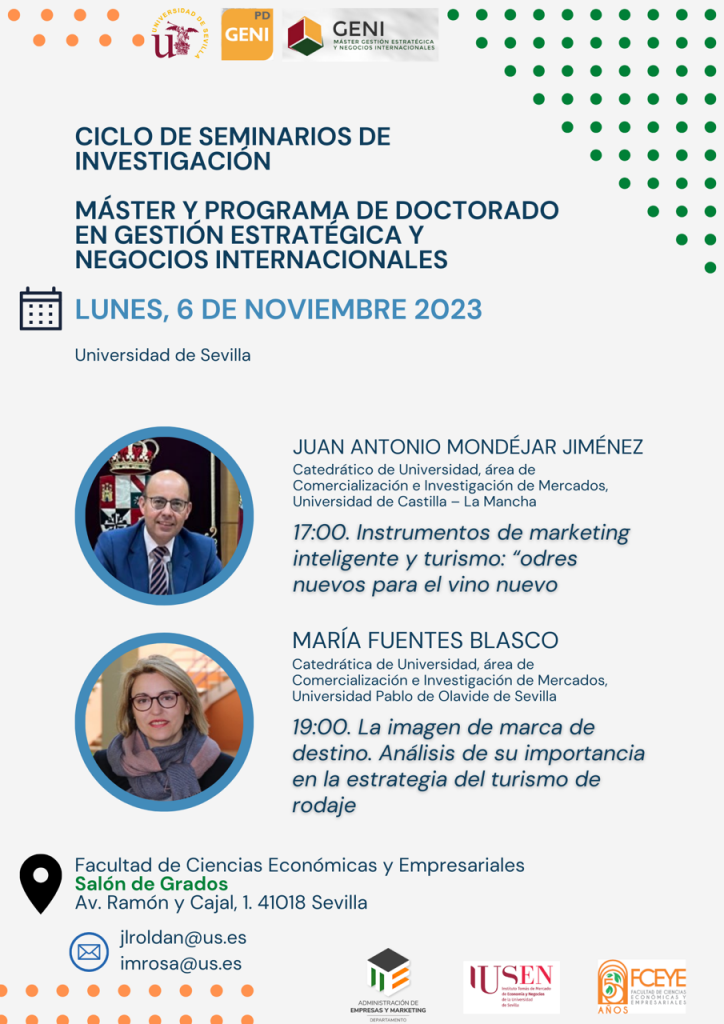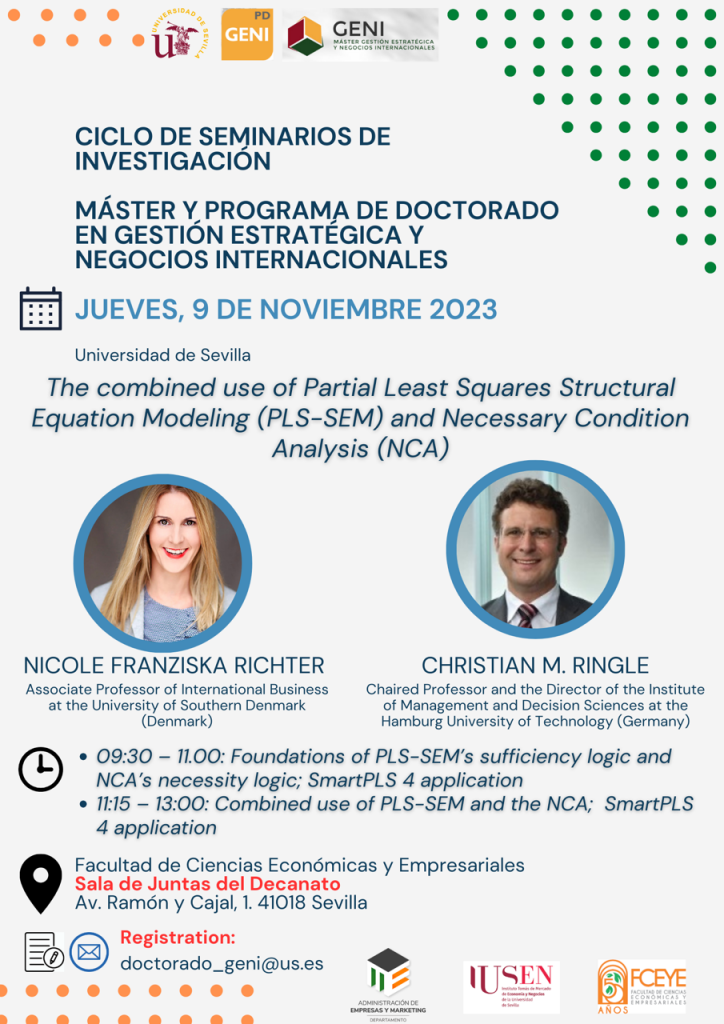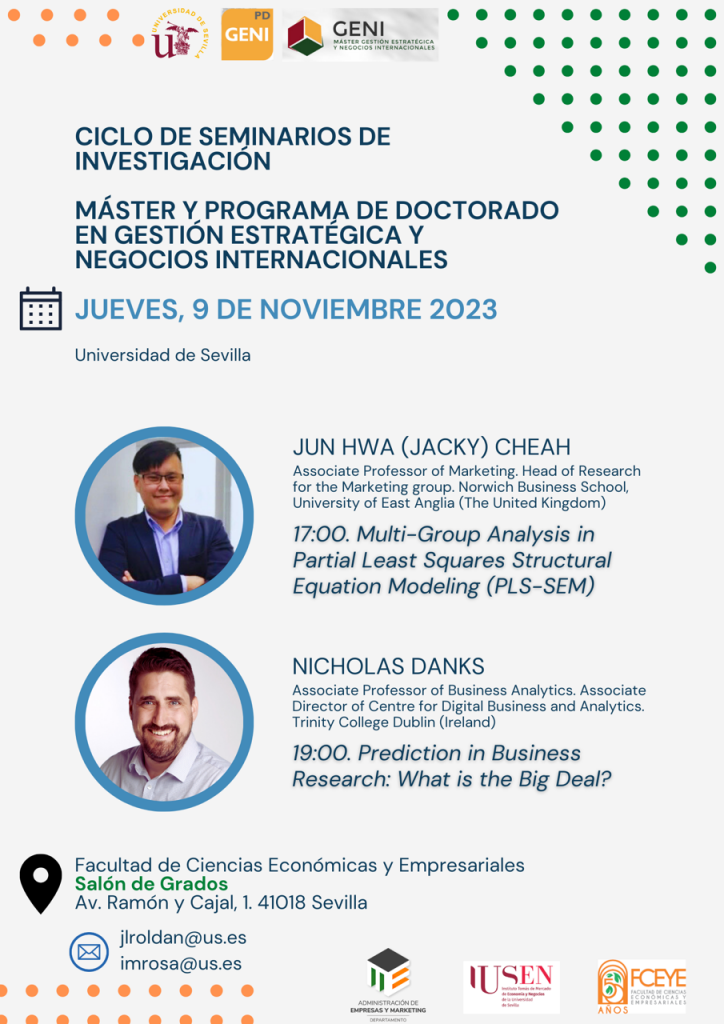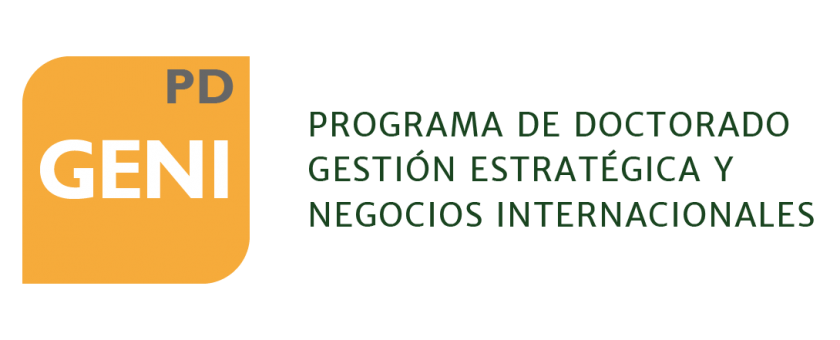Ciclo de Seminarios de Investigación. Facultad de Ciencias Económicas y Empresariales
Este Ciclo, que se desarrollará desde el 6 al 10 de noviembre de 2023, incluye una completa propuesta de actividades formativas dirigidas a la mejora y el avance en la formación de los alumnos de doctorado y de máster en los ámbitos teóricos y científicos, metodológicos, así como prácticos y procedimentales relativos a la investigación en el ámbito empresarial.
Lunes 6 de noviembre de 2023
17.00 horas: “Instrumentos de marketing inteligente y turismo: “odres nuevos para el vino nuevo”, conferencia impartida por el profesor Juan Antonio Mondéjar Jiménez, Catedrático de Universidad del Área de Comercialización e Investigación de Mercados de la Universidad de Castilla-La Mancha.
El sector turístico juega un papel fundamental en la economía española. En esta sesión se pretende ayudar a identificar las necesidades y soluciones para la implantación de Instrumentos de Marketing Inteligente (IMI) y dar respuesta a los retos de los destinos turísticos identificados en el contexto de la Red de Destinos Turísticos Inteligentes. En esta línea, generar nuevos conocimientos científicos, basados en evidencias, suponen un avance significativo del conocimiento científico actual en el ámbito turístico, mediante la investigación orientada a la búsqueda de soluciones a los principales retos a los que se enfrentan los destinos turísticos en España, para mejorar su capacidad competitiva y resiliencia a largo plazo. En esta línea, la difusión, transferencia y aplicabilidad del conocimiento generado hacia los destinos para su conocimiento y utilización por parte de los gestores públicos del destino, especialmente a nivel local, forman parte de la estrategia de difusión de los resultados del Proyecto.En esta línea, el turismo inteligente o smart tourism constituye un claro paso adelante en la evolución de las TIC en el turismo (Gretzel, 2022). El turismo inteligente se compone de tres capas principales: diseños inteligentes, ecosistemas empresariales inteligentes y experiencias inteligentes (Gretzel et al., 2015). Estos autores sostienen que el aspecto clave del turismo inteligente es la integración de las TIC en las infraestructuras físicas. Además, se considera importante identificar qué tecnologías hacen que un destino sea inteligente.
19.00 horas: “La imagen de marca de destino. Análisis de su importancia en la estrategia del turismo de rodaje”, conferencia impartida por la profesora María Fuentes Blasco, Catedrática de Universidad del Área de Comercialización e Investigación de Mercados de la Universidad Pablo de Olavide.
La sesión pretende ofrecer una aproximación a la importancia de la estrategia de marca de destino internacional en el turismo de rodaje (shooting tourism). Trabajaremos los conceptos de imagen del destino turístico desde la doble perspectiva orgánica e inducida, así como sus tres dimensiones estratégicas. La sesión se dinamizará con ejemplos aplicados al turismo de rodaje audiovisual, prestando especial atención al papel que tienen los Organismos de Gestión Turística (Destination Management Organizations) en la estrategia.
Salón de Grados de la Facultad de Ciencias Económicas y Empresariales de la Universidad de Sevilla

Martes 7 de noviembre de 2023
17.00 horas: “Who is driving CSR around the world? Unveiling the Big Three Uneven Influence”, conferencia impartida por el profesor Kurt Desender, profesor del Departamento de Administración de Empresas de la Universidad Carlos III.
We examine the impact of the Big Three asset managers – BlackRock, Vanguard, and State Street Global Advisors – on corporate social responsibility (CSR). As dominant players in the investment industry, the Big Three’s influence has sparked a debate regarding their commitment to sustainability and CSR. Our study analyzes their endorsement of CSR in both domestic and foreign markets. Using a comprehensive analysis of a large sample from 2002- 2020, we find a positive relationship between the Big Three and CSR performance in their domestic market, particularly in industries where their presence is significant. However, this relationship turns negative in foreign markets, influenced by external pressures and the presence of non-institutional blockholders. Our findings contribute to understanding the drivers of CSR performance, the role of institutional ownership in foreign markets, and the ongoing discussion surrounding the Big Three’s impact on strategic decision-making.
19.00 horas: “Mujer emprendedora, factores de liderazgo hacia la sostenibilidad”, conferencia impartida por la profesora Gabriela Ribes Giner, Catedrática de Organización de Empresas de la Universitat Politècnica de València (UPV).
En un contexto de globalización e internacionalización de las empresas, el liderazgo femenino, así como los factores que lo caracterizan y que lo impulsan, adquiere una especial relevancia. Es necesaria investigación y reflexión al respecto desde una perspectiva de sostenibilidad.
Salón de Grados de la Facultad de Ciencias Económicas y Empresariales de la Universidad de Sevilla

Miércoles 8 de noviembre de 2023 12:00 – 13:00 horas: Taller Metodológico “Lessons from the Backstage: tips and tricks from copyediting 200 FT50 papers”, conferencia impartida por Monica Birth, Senior copy editor for MIS Quarterly, Journal of the Association for Information Systems y MIS Quarterly Executive. A continuación habrá una mesa redonda moderada por Jason B. Thatcher, Milton F. Stauffer Professor, Department of Management Information Systems. Fox School of Business, Temple University (USA).
Sala de Juntas Decanato de Facultad de Ciencias Económicas y Empresariales de la Universidad de Sevilla
17.00 horas: “Plagiarism in the Era of Large Language Models: Updates, Peril, and Opportunities for Academic Writers”, conferencia impartida por el profesor Jason B. Thatcher, Milton F. Stauffer Professor, Department of Management Information Systems. Fox School of Business, Temple University (USA).
This presentation will introduce current thinking about plagiarism. It will review traditional “cut and paste” plagiarism as well as contemporary concerns about borrowing a “patchwork” of ideas or logics from other authors. It will explain these concepts, offer applied illustrations, and explain how generative artificial intelligence power by large language models makes plagiarism a concern for students, faculty, and industry researchers than ever before.
19.00 horas: “Identificando los caminos actuales de la Investigación de Gestión de Recursos Humanos vinculada a prácticas de alta implicación (HIWP), con un guiño a la Gestión de Operaciones y la IA generativa”, conferencia impartida por el profesor Juan Antonio Marín García, Catedrático de Universidad, Departamento de Organización de Empresas, Universitat Politècnica de València.
¡Embárcate en un viaje desde las prácticas de trabajo de alta implicación (high involvement work practices – HIWP) hasta el mundo de la Gestión de Operaciones, y descubre el fascinante estado actual de la investigación en Recursos Humanos! Descubre cómo, con las herramientas adecuadas, el mapa de HRM se transforma ante nuestros ojos y cómo la Inteligencia Artificial Generativa se puede convertir en un compañero de viaje ideal. Diseñada especialmente para estudiantes de máster y doctorado, esta charla combina lo último en tendencias con una perspectiva didáctica, facilitando un primer paso adentrándose en el mundo de la investigación en un ambiente didáctico, animado y enriquecedor.
Salón de Grados de la Facultad de Ciencias Económicas y Empresariales de la Universidad de Sevilla

Jueves 9 de noviembre de 2023
9:30 – 13:00 horas: “The combined use of Partial Least Squares Structural Equation Modeling (PLS-SEM) and Necessary Condition Analysis (NCA)“, workshop impartido por los profesores Nicole Franziska Richter (Associate Professor of International Business at the University of Southern Denmark (Denmark) y Christian M. Ringle (Chaired Professor and the Director of the Institute of Management and Decision Sciences at the Hamburg University of Technology, Germany).
This workshop introduces and encourages the combined use of partial least squares structural equation modeling (PLS-SEM) and the necessary condition analysis (NCA) that enables researchers to explore and validate hypotheses following a sufficiency logic, as well as hypotheses drawing on a necessity logic.
Sala de Juntas Decanato de Facultad de Ciencias Económicas y Empresariales de la Universidad de Sevilla

17.00 horas: “Multi-Group Analysis in Partial Least Squares Structural Equation Modeling (PLS-SEM)”, conferencia impartida por el profesor Jun Hwa (Jacky) Cheah, Associate Professor in Marketing, Norwich Business School, University of East Anglia (The United Kingdom).
Partial Least Squares Structural Equation Modeling (PLS-SEM) has gained widespread popularity in various fields for its flexibility and ability to handle complex structural models. Multi-group analysis in PLS-SEM extends its utility by allowing researchers to investigate group-specific differences and similarities within a given structural model. This sharing provides an overview of the key concepts and benefits of multi-group analysis in PLS-SEM. In the context of PLS-SEM, multi-group analysis enables researchers to assess whether the relationships between latent constructs and observed variables differ significantly across different subpopulations or groups. This methodology is particularly valuable when studying phenomena that exhibit heterogeneity among groups, such as cross-cultural studies, industry-specific analyses, or demographic variations.
This sharing outlines the main steps involved in conducting a multi-group analysis in PLS-SEM, which include group separation, measurement invariance assessment, structural model comparisons, and significance testing of group differences. Measurement invariance testing ensures that the measurement instruments used to capture latent constructs are reliable and comparable across groups. This allows for meaningful comparisons of structural model parameters, facilitating insights into variations or similarities between groups. Researchers can benefit from multi-group analysis in various ways, such as identifying group-specific drivers of outcomes, evaluating the generalizability of findings across different contexts, and informing tailored strategies for specific target groups. Additionally, this approach contributes to advancing the theoretical understanding of complex phenomena by uncovering nuanced differences and similarities between groups to derive more accurate and insightful conclusions from PLS-SEM studies.
19.00 horas: “Prediction in Business Research: What is the big deal?”, conferencia impartida por el profesor Nicholas Danks, Associate Professor of Business Analytics. Associate Director of Centre for Digital Business and Analytics. Trinity College Dublin (Ireland).
Researchers have now begun recognising the potential for predictive methods to extend and supplement traditional hypothetico-deductive research. However, it is still not clear what prediction adds to research beyond the traditional categorical hypothesis-testing perspective. In this talk I discuss why we need to consider the out-of-sample performance of models, and how out-of-sample predictive error is conceptually different from fitting error. Building upon this important distinction, I probe how predictive metrics and evaluation can add rigor and supplemental evidence of generalizability to inferential research studies. I then explore how predictive methods, such clustering, association rules, and regression and classification trees (amongst others) could be deployed in a research study to tease out nuance and detail and increase the value and extent of conclusions drawn therefrom.
Salón de Grados de la Facultad de Ciencias Económicas y Empresariales de la Universidad de Sevilla

Viernes 10 de noviembre de 2023
9:30 -13:00 horas: “Introduction to Structural Equation Modeling in R”, workshop impartido por el profesor Nicholas Danks, Associate Professor of Business Analytics. Associate Director of Centre for Digital Business and Analytics. Trinity College Dublin (Ireland).
Research methods have developed at an unprecedented rate in the recent decade, with researchers now applying several different analyses in a single research project. Indeed, researchers might not only apply mixed methods (qual and quant), but even mixed approaches (inductive, deductive, abductive), With this increase in complexity of the analytical methods, comes a commensurate increase in complexity of the tools required to suitably and rigorously analyze our phenomena of interest. I therefore propose that researchers would be empowered by learning to apply their research within a computational statistical environment, such as R or Python. In such an environment, researchers can apply different methods and approaches, different tools and algorithms, and even conduct simulations or modeling to arrive at conclusions. Computational statistical environments also present a previously unacknowledged, and yet vital dimension to scientific research – reproducibility and shareability. Research processes resolved to code, can be read, understood, reproduced, and extended by the scientific community. Thus, dramatically increasing both the impact and scope of your research. In this seminar, I present a simple introduction to using the R Studio statistical environment, and specifically I demonstrate the utility of conducting structural equation modeling in R. I demonstrate how the results and key parameters can be extracted and re-used in further analysis in interesting and creative ways. To this end, I will conduct a predictive modeling exercise on the results from a PLS-SEM analysis and demonstrate how the findings can supplement research. This seminar will be in-part conceptual in the introduction to the utility of the computational environment, as well as being didactic in the exact approach to conducting SEM in R.
Sala de Juntas Decanato de Facultad de Ciencias Económicas y Empresariales de la Universidad de Sevilla


